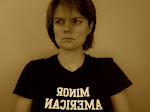

Thank God! C.A. Conrad's poems will finally arrive in bookstores. Soft Skull is putting out his "Deviant Propulsion" probably in a matter of days. I imagine this book will save many teenagers from spiritual and mental entropy all across the Midwest. C.A. Conrad, a close friend, is someone who looks at the world with awe and joy and humor and wisdom. This comes through in his poetry. I can't tell you how happy I am that this book will soon enter the world. I've posted the Publishers Weekly blurb below. All hail C.A. Conrad, gentle poetry king and goddess of Philadelphia.
Deviant Propulsion
C.A. Conrad. Soft Skull (PGW, dist.), $13.95 paper (102p) ISBN 1-932360-87-5
Sexy and outrageous, Conrad's debut fuses the confidence of the beats and the casual demeanor of more recent downtown New York performance poetry into short lines, exclamations and admonishments. Conrad's sentences can include a whimsy bordering on randomness: "It's True I Tell Ya My Father Is a 50 Cent Party Balloon," one title insists. He can also turn suddenly profound: "all the/ death has a/ way of/ getting us/ the love." If the specter of HIV looms heavily, it does battle with the happier spirit of Stonewall: Conrad imagines a "transvestite boxer... willing to wear pink gloves with drawings of Judy Garland's face" punching out Mike Tyson, and portrays himself "in a bishop's robe bless[ing] rush hour traffic with one hand, with a sign in the other 'IGNORE THIS BLESSING YOU HAVE ALL YOU NEED!' " Though he invokes celebrities and poetic mentors from Robert Creeley to Kevin Killian to Courtney Love, the best analogy for the Philadelphia-based Conrad is Allen Ginsberg, who also shocked America with his frankness, denounced hypocrisy in prose poems and in verse declamation, and who also hoped to embody the queer life of his times. (Jan.)




